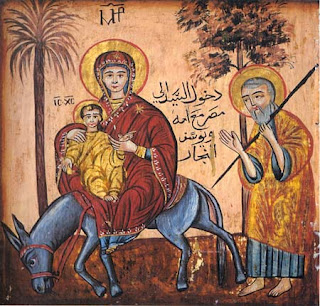Dear Father John, in responding to questions on this forum, you’ve often said something like, “the interior turbulence that the situation is causing you is most likely not from the Holy Spirit”. I think St. Ignatius says something similar when discussing the discernment of the spirits. Since Jesus and  Mary were perfect, how would you explain the great anguish and sadness that Jesus felt in the garden of Gethsemane or the anxiety and fear that Mary felt when Jesus was missing for three days? Aren’t these conditions supposed to indicate the absence of the Holy Spirit or some sort of imperfection of the soul?
Mary were perfect, how would you explain the great anguish and sadness that Jesus felt in the garden of Gethsemane or the anxiety and fear that Mary felt when Jesus was missing for three days? Aren’t these conditions supposed to indicate the absence of the Holy Spirit or some sort of imperfection of the soul?
Let’s start with the point St. Ignatius makes, and then reflect on the experience of Jesus and Mary.
St. Ignatius of Loyola’s Spiritual Exercises is, basically, a guide for retreat directors. It outlines a series of meditation topics, methods of prayer, and principles to help in the process of “the discernment of spirits.” The first set of principles for discernment deal with interpreting the experience of spiritual consolation and spiritual desolation. He goes into great detail defining those terms and describing what he means by them. He does this in order to help retreatants and retreat directors learn to identify and process what is going on inside the soul as a person seeks to follow God more closely. In the first two rules for the discernment of spirits, he makes two critical observations.
Two Key Insights
First, he points out that two “spirits” are interested in influencing our souls: The good spirit (God, and God’s messengers, like the angels), and the evil spirit (the devil and his minions). God wants to lead and guide and draw each one of us closer to himself; the devil wants to obstruct our progress towards God, and, if possible, turn us away from God entirely. But both “spirits” have to work within the confines of human nature, influencing us from within our souls, where we experience feelings, attractions, repugnances, thoughts, memories, desires… In reflecting on and interpreting those interior experiences, we exercise our freedom and make decisions, and our decisions either bring us closer to God or distance us from him. This is why St. Ignatius considers it so important to be able to identify the source of those interior experiences; we need to know whether they are being stirred up by the enemy of our soul in an effort to thwart our spiritual progress, or whether they are nudgings and whisperings from our Lord.
Second, he distinguishes two basic states in which particular individuals can find themselves. On the one hand, a person can be on the path of sin, living life by seeking happiness in any number of idols instead of in a relationship of obedience and love towards God. On the other hand, a person can be on the path of holiness, seeking to grow in friendship with God and to purify their souls from inordinate attachments that impair that friendship.
Contrary Influences
God and the devil will influence a person in contrary ways, depending upon which path they are on. If someone is on the path of sin, the devil will try to make that person feel content and satisfied and smug, so as to keep the person moving from sin to sin – away from God. God, on the other hand, will stir up dissatisfaction and turbulence in that soul, through the bite of conscience, through inner longings for “something more,” and through the light of reason, which cries out for meaning and truth.
If someone is on the path of holiness, the contrary will happen. The devil will stir up distaste, confusion, false reasons, turbulence – anything to impede the soul’s progress or to deceive it into leaving the “narrow gate and hard road” that leads to life (Matthew 7:14). In this situation, God will confirm the soul, comfort the soul, steady the soul, strengthen the soul – encouraging the person to continue forward in their service of God in their quest for deeper intimacy with Him.
The bread and butter of spiritual growth, then, consists in rejecting the influences of the evil spirit and cooperating with the guidance of the good spirit.
“Dour Combat”
You can see, therefore, that each individual soul is really a battleground where natural impulses, reactions, and desires are always present, but where supernatural influences – both good and evil – are also constantly at work. This is why the Church teaches so clearly and consistently that life on earth is a continual struggle: “The whole of man’s history has been the story of dour combat with the powers of evil, stretching, so our Lord tells us, from the very dawn of history until the last day. Finding himself in the midst of the battlefield man has to struggle to do what is right, and it is at great cost to himself, and aided by God’s grace, that he succeeds in achieving his own inner integrity” (Catholic Catechism #409). This is also why Our Lord, when he promised to give us the gift of peace, also explained that “My peace I give to you; not as the world gives do I give to you” (John 14:27).
Earth Is not Heaven
In other words, as long as we are journeying here on earth, we will not experience the complete satisfaction and fulfillment that God is preparing for us in heaven. As our relationship with God grows, our experience of interior happiness will deepen and mature, but it will always be accompanied by the sorrows that necessarily flow from life in a fallen world (“Blessed are those who mourn, for they shall be comforted” [Matthew 5:5]). And it will also always be accompanied by the spiritual warfare (see Ephesians 6:10-20 and 1 Peter 5:8) that surrounds us and disturbs our own souls, which God permits but also limits: “God is faithful, who will not allow you to be tempted beyond what you are able, but with the temptation will provide the way of escape also, so that you will be able to endure it (1 Corinthians 10:13).
The Sorrows of Jesus and Mary
Now, I hope, we can understand better why Jesus and Mary both experienced sorrow, anguish, and anxiety during their earthly lives. They both were fully human, and even though both were exempt from the concupiscence that the rest of us inherit from original sin (concupiscence is that interior division by which we find ourselves strongly attracted to selfishness and evil), both were also living their missions in a fallen world, and fully engaged in the “dour combat with the powers of evil.”
Jesus’ Anxiety
The Garden of Gethsemane wasn’t the only episode from Christ’s life where he suffered: he wept over the death of Lazarus, he experienced frustration at the slowness of his followers to understand his message, he faced intense temptation in the desert, he suffered righteous anger in the face of the stubborn hypocrisy of the Pharisees and the worldliness of the Temple leaders… In Gethsemane, and throughout his Passion, his suffering reached its maximum intensity, because it was then that he took upon himself the guilt of our sins, of every sin: “[God] He made Him who knew no sin to be sin on our behalf” (2 Corinthians 5:21). That, for a human nature so pure in love and holiness, is the greatest of torments. At the same time, the devil did everything possible to dissuade our Lord from following through with the Father’s will. Jesus was, obviously, on the path of holiness, and so the devil stirred up interior turbulence in order to make him deviate, but Jesus responded with prayer and obedience, and the good spirit comforted and strengthened him: “Now an angel from heaven appeared to Him, strengthening Him” (Luke 22:43). This is an example for all of us to follow.
Mary’s Anxiety
Mary suffered when Jesus was left behind in the Temple for three days, but certainly she suffered throughout her life, and most especially during her divine Son’s Passion and death, when Simeon’s prophecy about a sword piercing her heart was fulfilled (see Luke 2:35). This interior turbulence flowed, again, from living in a fallen world, where sin and evil crash against our human nature like storms and waves and floods (see Matthew 7:24-27). But she didn’t allow this suffering, this turbulence, this anxiety, to undermine her faith and trust in God. And so, even on Calvary, “near the cross of Jesus stood his mother…” (John 19:25). She was firm and faithful, because her love was true and total. She too, just like the rest of us, grew in her relationship with God through the sufferings that life in a fallen world thrust upon her, through exercising her trust, her courage, her love, her endurance in the midst of them: “…through many tribulations we must enter the Kingdom of God” (Acts 14:22).
In short, we will continually experience both consolation and desolation in the battlefield of our souls. What matters is how we react to each of them. The true north of spiritual progress – God’s will – shines strong and bright even in the storms, and we must ever lift our eyes to it, guiding every decision according to its saving light: “Jesus said to them, “My food is to do the will of Him who sent Me and to accomplish His work.” (John 4:34).


